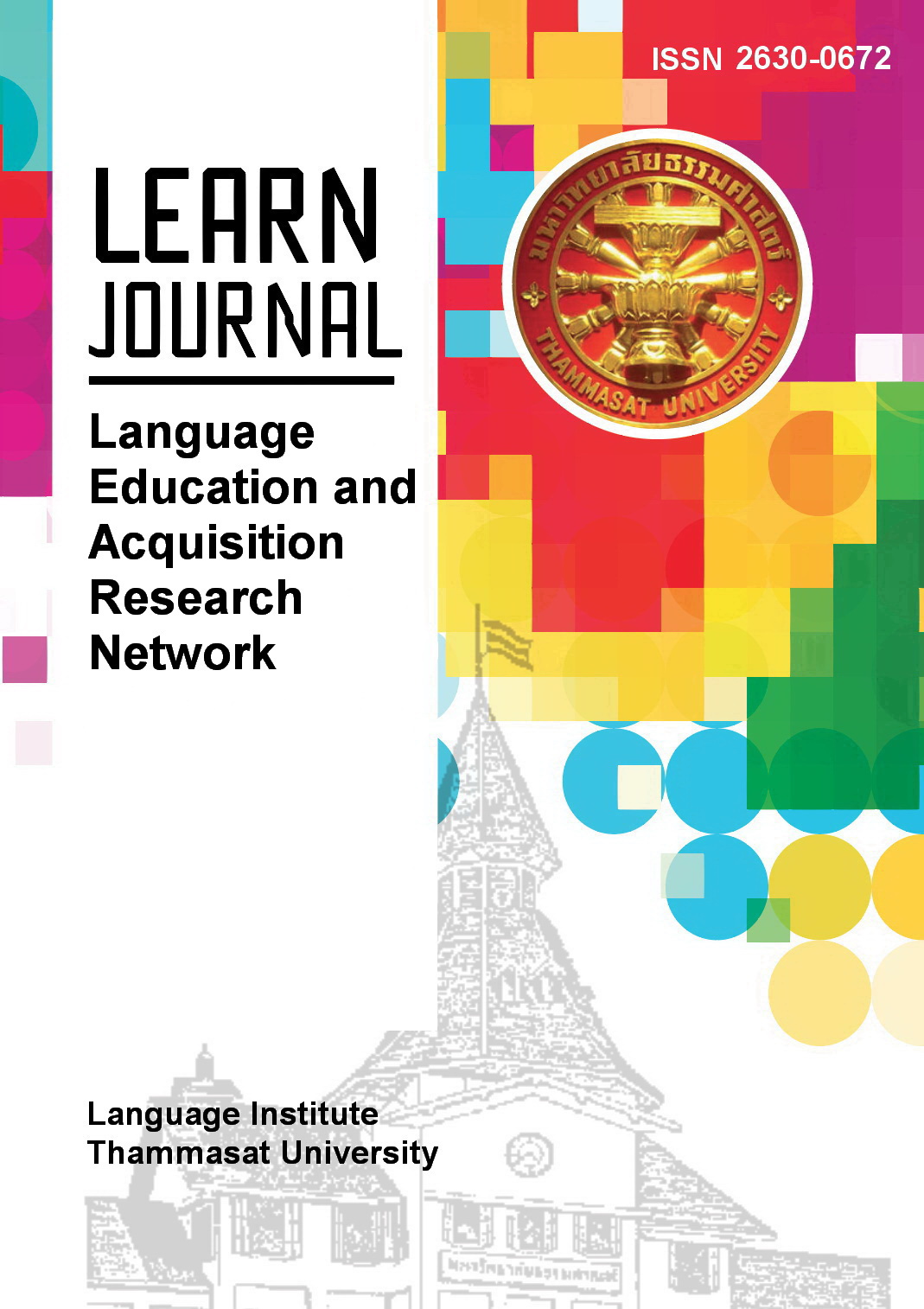Variable Production of English Object-Experiencer Psych Predicates by L1 Thai EFL First-Year University Students: An Application of the Missing Surface Inflection Hypothesis (MSIH)
Main Article Content
Abstract
The purpose of this research is to investigate the variable production of English Object-Experiencer (OE) psych predicates among 80 L1 Thai EFL first-year university students. Psych verbs are notable for posing difficulty for learners due to a unique property that violates Grimshaw’s (1990) Thematic Hierarchy. The participants were given a cloze test and a translation test with six psych verbs and corresponding predicates, and six individuals were chosen to perform the spontaneous oral translation. Based on the Missing Surface Inflection Hypothesis (MSIH), the findings validated two of the study’s research questions. First, variable production was detected in L1 Thai students’ usage of OE psych predicates in three grammatical constructions examined. Second, the MSIH attributed variable production of L2 functional morphology to mapping problems: L1 Thai students were confused about how to link thematic roles to subject and object positions since the OE psych predicates breached the Thematic Hierarchy. Furthermore, the MSIH reveals that phono-syntactic factors play a role in variable production, indicating that during live translation, participants struggled with the -ed sound while forming correct copular verbs required in sentences with OE psych predicates.
Article Details
References
Baker, M. C. (1988) Incorporation: A Theory of Grammatical Function Changing. University of Chicago Press.
Bialystock, E. (1997). Anatomy of a revolution. The future of the cognitive revolution, 109-113.
Birdsong, D. (1992) Ultimate attainment in SLA. Language, 68, 706-755.
Chen, D. (1997). L2 acquisition of psych predicates by native speakers of Chinese and French. Doctoral dissertation, McGill University, Montreal.
Chomsky, N. (1967) Recent contributions to the theory of innate ideas. Synthese, 17(1), 2-11.
Chomsky, N. (1986/1993). Lectures on Government and Binding: The Pisa Lectures (No.9). Walter de Gruyter.
Dulay, H. C., & Burt, M. K. (1974). Natural sequences in child second language acquisition 1. Language learning, 24(1), 37-53.
Franceschina, F. (2001) Morphological or syntactic deficits in near-native speakers? an assessment of some current proposals. Second Language Research, 17(3), 213-247.
Grimshaw, J. (1990). Argument structure. Cambridge, MA: MIT Press. Hawkins, R., & Chan, C. Y. H. (1997) The partial availability of Universal Grammar in second language acquisition: the ‘Failed Functional Features Hypothesis’. Second Language Research, 13(3), 187-226.
Hawkins, R. (2001). Second language syntax: A generative introduction.
Wiley-Blackwell.
Hawkins, R., & Liszka, S. (2003) Locating the source of defective past tense marking in advanced of L2 English speakers. Language Acquisition and Language Disorders, 30, 21-44.
Haznedar, B., & Schwartz, B. D. (1997). Are there optional infinitives in child L2 acquisition. In Proceedings of the 21st annual Boston University conference on language development, 21, 257-68.
Johnson, J. S., & Newport, E. L. (1989) Critical period effects in second language learning: the influence of maturational state on the acquisition of English as a second language. Cognitive Psychology, 21(1), 60-99.
Johnson, J. S., & Newport, E. L. (1991) Critical period effects on universal properties of language: The status of subjacency in the acquisition of a second language. Cognition, 39(3), 215-258.
Lardiere, D. (1998) Case and tense in the ‘fossilized’ steady state. Second Language Research, 14(1), 1-26.
Lardiere, D. (2003). Second language knowledge of [+/-past] vs.[±finite]. In Proceedings of the 6th generative approaches to second language acquisition conference (GASLA 2002) Cascadilla Proceedings Project, 176-189.
Levin, B. (1993). English verb classes and alternations: A preliminary investigation. 188-193. University of Chicago Press.
Montrul, S. (2000). Transitivity alternation in L2 acquisition: Toward a modular view of transfer. Studies in Second Language Acquisition 22(2), 229-273.
Montrul, S. (2001a). The acquisition of causative/inchoative verbs in L2 Turkish. Language Acquisition, 9(1), 1-58.
Montrul S. (2001b). First-language-constrained variability in the second language acquisition of argument-structure-changing morphology with causative verbs. Second Language Research, 17(2), 144-194.
Namtapi I. (2018). Are–ING psych adjectives more difficult to acquire than–ED psych adjectives? Evidence from L1 Thai learners of L2 English. Thoughts, (1), 29-50.
Nordquist, R. (2020, August 29). Definition and examples of psychological verbs. Retrieved from https://www.thoughtco.com/psych-verb-definition-1691550.
Perlmutter, D., & Postal, P. (1984). The 1-advancement exclusiveness law. Studies in relational grammar, 2(81), 125.
Primus, B. (2004). Protoroles and verb type: Case variation in psychological verbs. Semantic Roles, Edited by Kailuweit, Rolf & Hummel, Martin,
Tübingen: Narr, 377–401.
Prévost, P., & White, L. (2000) Missing surface inflection or impairment in second language acquisition? evidence from tense and agreement. Second Language Research, 16(2), 103-133.
Sato, Y. (2003). Japanese learners’ linking problems with English psych verbs. Reading Working Papers in Linguistics, 7, 125-144.
Schachter, J. (1989) Testing a proposed universal. In S. Gass & J. Schachter (Eds.), Linguistic perspectives on second language acquisition (pp. 73-88). Cambridge University Press.
Schachter, J. (1990) On the issue of completeness in second language acquisition. Second Language Research, 6(2), 93-124.
Shutt, M., & Pongpairoj, N. (2011) Problems of Object-Experiencer Psych Verbs among L1 Thai Learners of English. In Proceedings of the International Conference Expanding Horizons in English Language and Literary Studies (ELLS 2011), 457-470.
White, L., Montrul, S., Hirakawa, M., Chen, D., De Garavito, J. B., & Brown, C. (1998). Zero morphology and the T/SM restriction in the L2 acquisition of psych verbs. Language Acquisition and Language Disorders, 19, 257-282.
White, L. (2003) Fossilization in steady state L2 grammars: persistent problems with inflectional morphology. Bilingual Language and Cognition, 6(2), 129-141.
Witoon, S. and Singhapreecha, P. (2012). Psych vs. causative: A view from Thai EFL learners. In Proceedings of the International Graduate Conference, Language Institute Thammasat University. 161-167.


